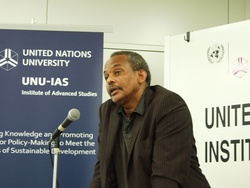
United Nations University (UNU IAS) | 13 November 2009
Summary of Presentation:
On Friday, 13 November 2009 from 14:00 to 15:30, UNU-IAS welcomed Dr. Zeremariam Fre for a public presentation, "The New Phenomenon of Land Grabbing in Africa and its Impact on Livelihoods and Ecosystems".
The question of land grabbing in the developing world, including Eastern Europe, could be seen as a new phenomenon to some, and to others it could well be new wine in old bottles given the various stakeholders involved in land grabbing both at domestic and international levels. It is important that land grabbing is contextualised in the regions where it is taking place to have a better understanding of the various stakeholders, their production objectives, their relation to the ecology and other the factors at play. By a better understanding of the political, ecological, class and governance contexts where the land grab is occurring, we may be able to not only grasp the situation but also help in finding some solutions to the problem.
This presentation focused on the African context of both ‘’internal’’ and ‘’global’’ land grabbing experiences, shedding light on some practical experiences as they impact on the livelihoods of the rural poor and the ecology. Various references to Ethiopia, Sudan and Eritrea with particular focus to pastoral and peasant farming communities in those countries were briefly highlighted. These reflections were designed to promote debate on the land grabbing issue from a livelihoods and ecological perspective.
Further Resources:
- Download the Presentation ppt here
- View the UNU-IAS webcast of the event:
The New Phenomenon of Land Grabbing in Africa and its Impact on Livelihoods and Ecosystems by Dr. Zeremariam Fre, Senior Lecturer at University College London (UCL) Development Planning Unit & Director of the Pastoral and Environmental Network in the Horn of Africa (PENHA)
[Archived Video- 48 minutes]
Q&A
[Archived Video- 36 minutes]
About the Speaker:
Dr. Zeremariam Fre obtained his MSc and PhD in agricultural extension and pastoral systems from Reading University in the UK. He is currently a Senior Lecturer at the University College London (UCL) Development Planning Unit and Director of the Pastoral and Environmental Network in the Horn of Africa (PENHA). He is also a Visiting Scholar at the Centre for African Area Studies of Japan at the Kyoto University.
Fre specialises in pastoralism, rural livelihoods, indigenous knowledge systems and arid land resource management. He is the founder- executive director of the Pastoral and Environmental Network in the Horn of Africa (PENHA), an African led Regional NGO working among the most disadvantaged communities in the Greater Horn Region including Sudan, Uganda, Kenya, Somalia/Somaliland, Eritrea, Ethiopia Djibouti and South Africa. Fre has over 25 years of development work experience and has worked as a consultant and advisor for a number of international organisations including EU, EDF, NORAD, Danida, NOVIB, IIED, Oxfam-GB, CAFOD, ITDG, FAO, IFAD, UNCCD-IGAD, UNICEF, ACORD, SOS-Sahel, Norwegian Peoples Aid (NPA), National Governments Ministries and NGOs in the Greater Horn of Africa.
Fre’s research interests include: evolving livelihoods, urban-rural/rural-urban interactions, indigenous knowledge systems, resource based conflicts, sustainability of urban and peri-urban agriculture and destitution and urbanisation among rural communities in Africa.













